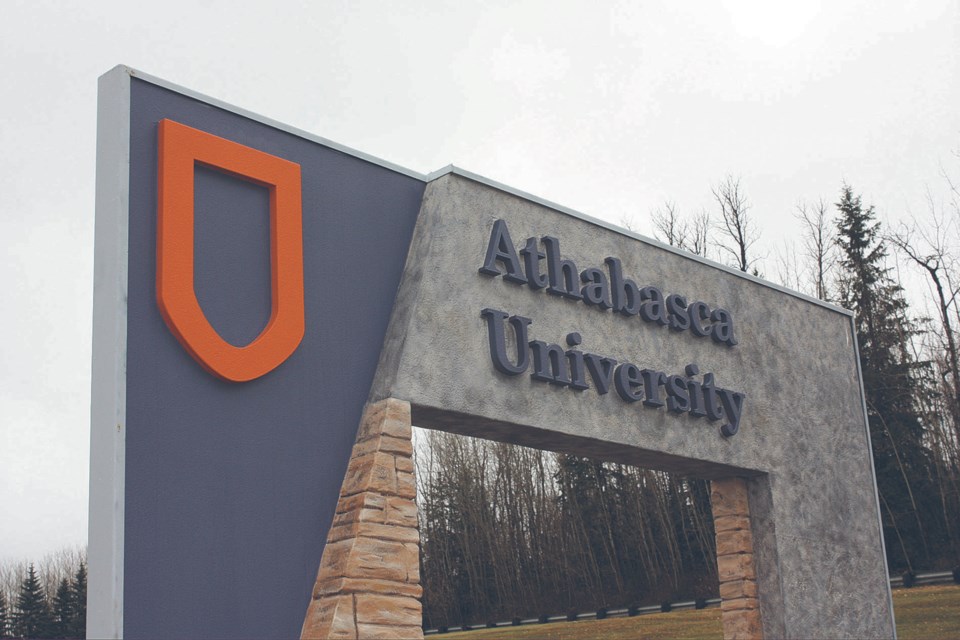ATHABASCA – Athabasca University is returning convocation to the town for the first time since before the COVID-19 pandemic. The two-day event gives locals the opportunity to show off their beloved community, but it’s also a chance for the region to learn from Athabasca University’s wide range of graduates.
Some of those graduates will be returning home, like Dr. Meggan Franks, an Athabasca native who left the town (and the country) on a track and field scholarship that took her to Mississippi State University. There, she completed her undergraduate degree and MBA before Athabasca University gave her a path to pursue her Doctor of Business Administration while still working full-time and raising her kids.
“It’s been a phenomenal experience,” said Franks, who said she had family ties to the school long before she ever considered enrolling. “For being 2,500 miles away from where I live currently, when I call I sometimes talk to people I know like family.”
During her time at AU, Franks represented the school in the Three Minute Thesis (3MT) competition, where graduate students have three minutes to present their thesis. For Franks, the public speaking part wasn’t the challenge — her childhood in 4-H left her well-prepared for that section. Distilling her years of research and life experience into three minutes was more challenging.
“I really focused on the storytelling, sharing some of the experiences I’ve had that have really changed me and made it seem like what I was doing was really important,” said Franks, whose thesis focused on volunteer management and engagement. She helped coordinate volunteer teams in the aftermath of Hurricane Katrina, and she said that process showed how impactful volunteers can be.
“There’s been several hurricanes and several tornadoes in the South where I was working with teams to try to mobilize teams of volunteers to help with the cleanup efforts,” she said. “That’s something where I’ve had the firsthand opportunity to experience just how disastrous those events are and how important community is.”
In total, six Athabasca students and one Boyle student will be crossing the stage June 19 and 20, including two AU employees. Janice Day is a coordinator for graduate students in the Faculty of Humanities and Social Services, and she’ll be receiving her graduate diploma in leadership and management on June 20.
“When I had the opportunity to finish my credentials knowing I could walk the stage with the convocation being in Athabasca, I jumped at it,” said Day. “One day I’m going have my staff hat on and be volunteering helping the students with their celebrations, and the next day I’m going to just be a student and experience it from their point of view.”
Day said her diploma focused on supporting staff through change, as well as how to mentor and empower people. Given the similarities to her day job, she said it was a fabulous experience that allowed her to connect the two.
“There were quite a few final assignments where I used real examples of problems I was experiencing at work,” said Day. “I was able to address some barriers and utilize the skills within the actual coursework to address some challenges I was having in my role.”
On the opposite end of the spectrum is 21-year-old Andrei Afilipoaei. The young Calgarian enrolled at AU as a 15-year-old — a full year before he was able to select a degree stream.
“For the first year I basically just took courses in University for the program I knew I would sign up for, but I couldn’t actually sign up for the degree program until I was 16,” said Afilipoaei.
Afilipoaei decided to go with AU because it allowed him to pursue a career in professional tennis at the same time, although said career was unfortunately halted by the COVID-19 pandemic.
“Another great advantage with AU was that I could pursue my interest academically in applied mathematics — certain other universities did not have an exact applied mathematics program,” he said. For the curious, applied mathematics is the academic intersection between “pure” mathematics and the everyday world. Students apply mathematic formulas and theory to practical problems, often through the creation of models.
“I had relatively limited interactions with professors and so as a result much of (my learning) was entirely self-driven,” said Afilipoaei. “The advantage of this is that if you can master this type of content, you develop a very advanced skill of self-learning, and it helps you master the topic very easily.
“Unlike a conventional university with a fixed schedule … if you’re having trouble with a particular course topic, you could spend more time on that and less on others that you understood more easily,” he concluded.
This is the first part in a two-part series sharing stories from Athabasca University’s graduates. Check back June 18 for more stories about the people that make convocation special.



